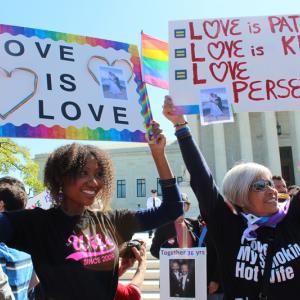The Rev. Gay Clark Jennings is the president of the Episcopal Church’s lay and clergy House of Deputies and is a member of the worldwide Anglican Consultative Council. She is a founding steering committee member of the Chicago Consultation.
Posts By This Author
Why Reconciliation With President-Elect Trump May Be Impossible for Some Christians
I fear now, as I have feared for months, the impact of his presidency on vulnerable people — including the white and working-class voters in places like my home state of Ohio who lent him their support.
Christians always have disagreements about policy proposals or party platforms during election seasons. But this year, I wonder how white Christians who read the same Scriptures and hold many of the same beliefs that I do could support a man who in word and deed has flaunted the core teachings of our faith.
An Open Letter to the Supreme Court as You Consider Same-Sex Marriage
People who argue against marriage equality frequently do so for religious reasons, even if they cast their argument in secular terms. While I believe there are strong constitutional arguments for striking down bans on marriage equality, I support striking down these bans because of my faith, not in spite of it.
For too long, religious institutions have contributed to the scourge of homophobia that fuels the discrimination that this case seeks to strike down. Far too many of us are familiar with the discrimination, fear, and violence that gay and lesbian people have suffered while people of faith turned a blind eye or, worse yet, acted as perpetrators.
Christians Worship a Child Who Fled Violence in His Home Country
This summer, many Americans are watching in helpless horror as more than 52,000 children fleeing violence stream over our southern border. Many of them are making a dangerous journey by themselves to escape murder rates and gang violence in Central America, particularly El Salvador and Honduras, that are unparalleled except in countries at war.
People of goodwill at the border have offered food, water, shelter, and compassionate care to these refugee children. But protesters have screamed epithets at them and blocked buses carrying them to processing centers, despite the fact that it is not illegal for people to cross the U.S. border and ask for protection under U.S. law.
As politicians focus on midterm elections rather than on children in crisis, it’s worth remembering: Christians worship a child who fled from violence in his home country.
The Gospel of Matthew recounts the story of King Herod of Judea, who slaughtered all the babies and toddlers around Bethlehem in a desperate attempt to prevent the reign of Jesus — the child he had been told would become a king.
COMMENTARY: The Church's Role in, and Against, Homophobia Across Africa
In the last month, many Westerners watched in horror as Uganda, and then Nigeria, enacted laws that are brutally repressive to lesbian, gay, bisexual, and transgender people.
The fate of a bill passed by the Ugandan parliament remains uncertain after President Yoweri Museveni refused to sign it, but news reports from Nigeria indicate that there have been mass arrests of gay men following President Goodluck Jonathan’s signing of the National Assembly’s anti-gay bill.
World leaders, including United Nations Secretary-General Ban Ki-moon and U.S. Secretary of State John Kerry, have expressed their dismay. Many Christian leaders around the world, regrettably, have been largely unwilling to criticize Christian leaders in Africa who cheered the passage of these punitive laws.



